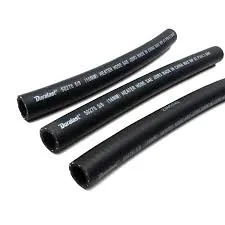oil hose
Dec . 19, 2024 09:33 Back to list
oil hose
Understanding Oil Hoses Essential Components in Industrial Applications
In the modern industrial landscape, where efficiency and safety remain paramount, the role of oil hoses cannot be underestimated. These specialized tubes are designed for the transportation of oil and other petroleum products, ensuring that the flow is both secure and reliable. This article delves into the various types, uses, and important considerations when working with oil hoses.
What Are Oil Hoses?
Oil hoses are flexible tubes made from specific materials that are resistant to the corrosive effects of oil and other substances. They are crucial in various applications, including oil extraction, transportation, refining, and even in automotive industries. The construction of oil hoses typically includes a rubber or thermoplastic inner lining, reinforced with a layer of fibers, and an outer cover designed to withstand external wear and environmental factors.
Types of Oil Hoses
There are several types of oil hoses, each designed for specific applications
1. Suction Hoses These hoses are utilized to pull oil from a tank or reservoir. Their design allows for the ingress of fluids through a smooth interior, which minimizes turbulence.
2. Discharge Hoses Designed for the expulsion of oil, discharge hoses are thicker and more robust. They can handle high pressure and are often used in tank trucks and storage facilities.
3. High-Pressure Hoses Used in hydraulic systems, these hoses can withstand significant pressure and are essential for applications that involve heavy machinery and equipment.
4. Food-Grade Oil Hoses In industries where oils are used in food processing, specialized hoses are needed to ensure that the materials do not contaminate the product.
5. Custom Hoses Many companies require hoses that are specifically tailored for their operations. Custom oil hoses can be designed in various lengths and diameters to fit particular requirements.
Applications of Oil Hoses
oil hose

Oil hoses are utilized in a range of applications across different sectors. In the oil and gas industry, they facilitate the transfer of crude oil from drilling sites to refineries. In the automotive sector, oil hoses transport engine oil, hydraulic fluids, and gasoline. Additionally, oil hoses are critical in manufacturing plants, where they are used in equipment to deliver lubricants and coolants that maintain machinery efficiency.
Safety Considerations
While oil hoses are designed to be durable and reliable, there are still essential safety considerations to keep in mind. Regular inspections are vital to identify signs of wear, cracks, and other forms of degradation. It is recommended to follow the manufacturer’s guidelines regarding usage and maintenance. Moreover, ensuring that hoses are properly stored and handled can significantly increase their lifespan and reduce the risk of accidents.
Choosing the Right Oil Hose
Selecting the appropriate oil hose requires careful consideration of several factors
- Material Compatibility Ensure that the hose material is compatible with the type of oil being transported to prevent chemical reactions and hose degradation.
- Pressure Ratings It’s crucial to choose a hose that can handle the pressure of your specific application. Overloading a hose can lead to catastrophic failures.
- Temperature Resistance Different applications can expose hoses to varying temperatures. Ensuring that the selected hose can withstand these temperatures is vital.
- Flexibility and Bend Radius Depending on the installation, the flexibility of the hose may be important. Evaluate the radius within which the hose needs to bend, as this can affect flow efficiency.
Conclusion
In conclusion, oil hoses play an indispensable role in various sectors of industry, providing safe and efficient transport for oils and other fluids. Understanding the different types of oil hoses, their applications, and safety considerations is essential for ensuring that operations run smoothly and without hazardous incidents. By choosing the right hose and maintaining it properly, industries can enhance productivity and minimize risks associated with oil handling. As technology evolves, oil hoses will likely continue to improve, benefiting industries worldwide.
